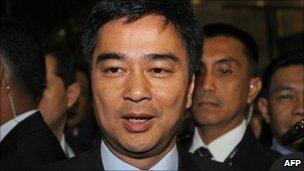Thailand election on 3 July will test PM Abhisit
- Published

Thai PM Abhisit Vejjajiva said it was time for people to decide to move forward
Thailand will hold a general election on 3 July, the government has said.
The king has approved a bill to dissolve parliament and this will take effect on Tuesday, a spokesman said.
The poll will be the first electoral test for Prime Minister Abhisit Vejjajiva, whose coalition government came to power in 2008 after a court dissolved the then governing party.
It comes a year after violent anti-government protests in Bangkok which left more than 90 people dead.
Thailand remains deeply divided and, says the BBC's South East Asia correspondent Rachel Harvey, all signs point to a very close race.
Divided nation
In a recorded television message, Mr Abhisit said the election would mark a new beginning for Thailand.
He is seeking the direct popular mandate his critics say he currently lacks.
The polls will be the second held since the military ousted former leader Thaksin Shinawatra in a bloodless coup in 2006.
Mr Thaksin's allies won the first post-coup polls in 2007 but the governing party and many of its lawmakers were subsequently banned from politics by court rulings.
Mr Abhisit's coalition came to power in December 2008 via a parliamentary vote.
Anti-government protesters then paralysed parts of Bangkok last year, accusing Mr Abhisit's administration of a lack of legitimacy and demanding fresh elections.
More than 90 people were killed during the 10-week stand-off, which ended on 19 May when troops cleared the "red-shirt" protesters from the streets.
Analysts fear the poll could reignite tensions in the politically divided nation.
Mr Abhisit's Democrat Party is pitted against an opposition still effectively controlled by Mr Thaksin, our correspondent adds.
In his televised address, Mr Abhisit said it was now time for the Thai people to decide: did people want to move forward, he asked, backward or in circles.